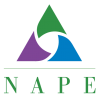Diversity in Technology Leadership
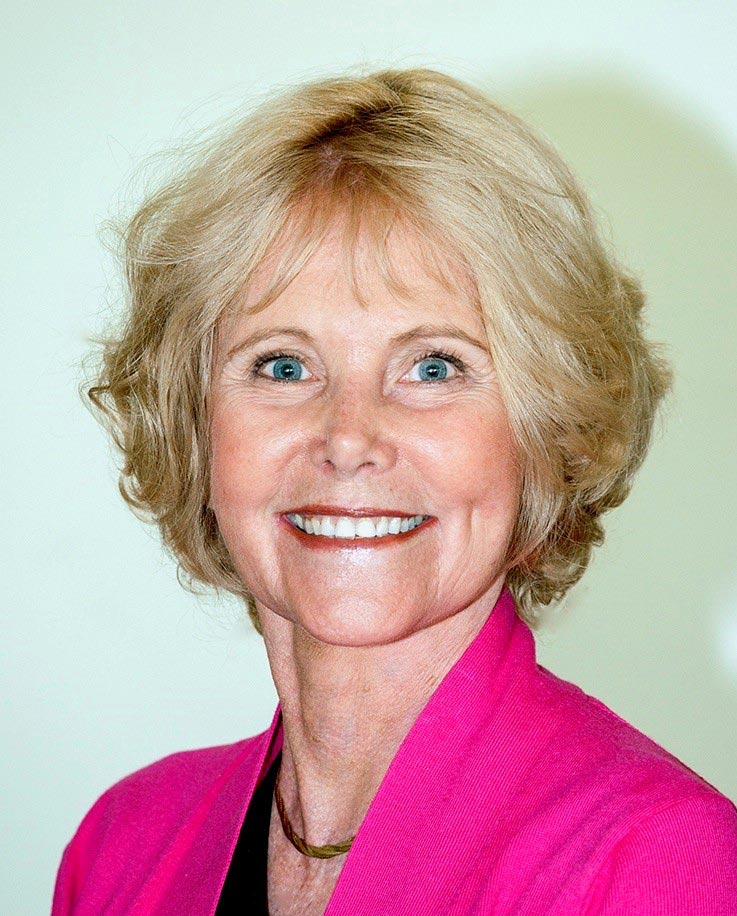
Dr. Sheryl Burgstahler lives and breathes the idea that diversity of thought enhances communities and has profound impact on individuals, the region, and the world. She has mobilized countless people to engage technology to provide equal access to individuals with disabilities – on the University of Washington campus, at the state and local level, and on a national and international scale. Her creativity and dedication has brought people together and facilitated unimaginable projects in the field of technology and disability. This work has unlocked the potential of countless “thought leaders” from underrepresented groups that would have otherwise not had a voice at the table – primarily individuals with disabilities, but others that include English-language learners, women, racial/ethnic minorities, first generation college students, persons of low socio-economic status, and individuals that may belong to more than one underrepresented or underserved group.
Dr. Burgstahler is the director of Accessible Technology Services at the University of Washington in Seattle. This unit includes two teams. The IT Accessibility Team (ATC) ensures technology used at the University is accessible to students, faculty, and staff (www.washington.edu/itconnect/accessibility/atl/). The DO-IT team—where DO-IT stands for Disabilities, Opportunities, Internetworking, and Technology—works nation-wide to promote the inclusive design of courses, services, and technology and to assist students with disabilities in the fields of science, technology, engineering and mathematics (STEM) (www.uw.edu/doit).
These two centers promote (1) the use of mainstream and assistive technology and other interventions to support the success of students with disabilities in postsecondary education and careers and (2) the development of facilities, computer labs, academic and administrative software, websites, multimedia, instruction, and distance learning programs that are welcoming and accessible to individuals with disabilities. The ATC focuses efforts at the UW; the DO-IT Center reaches national and international audiences with the support of federal, state, corporate, foundation, and private funds. Dr. Burgstahler’s programs have also taught technology, Internet, and college/career preparation skills to thousands of teens with disabilities attending summer camps and academic/career transition workshops. Over the last decade she has implemented powerful programs to replicate successful practices in the region such as DO-IT’s AccessSTEM project and throughout the United States and beyond through DO-IT’s ambitious AccessEngineering and AccessComputing projects.
Dr. Burgstahler authored a book, Perspectives of STEM Students with Disabilities: Our journeys, communities and big ideas. She also has authored or co-authored a large number of brochures, tip sheets, books and book chapters, and training materials that demonstrate how technology can be used to better serve diverse patrons of libraries, museums, science labs and other physical spaces, and community projects. She has developed materials about welcoming veterans onto college campuses and into the workplace, again capitalizing on technology to provide effective mentoring, access to information technology, and more. She is also an Affiliate Professor in the College of Education. Her teaching and research focus on the successful transition of students with disabilities to college and careers and on the application of universal design to instruction, student services, technology, and physical spaces as they pursue college studies and careers.
Unsung Hero
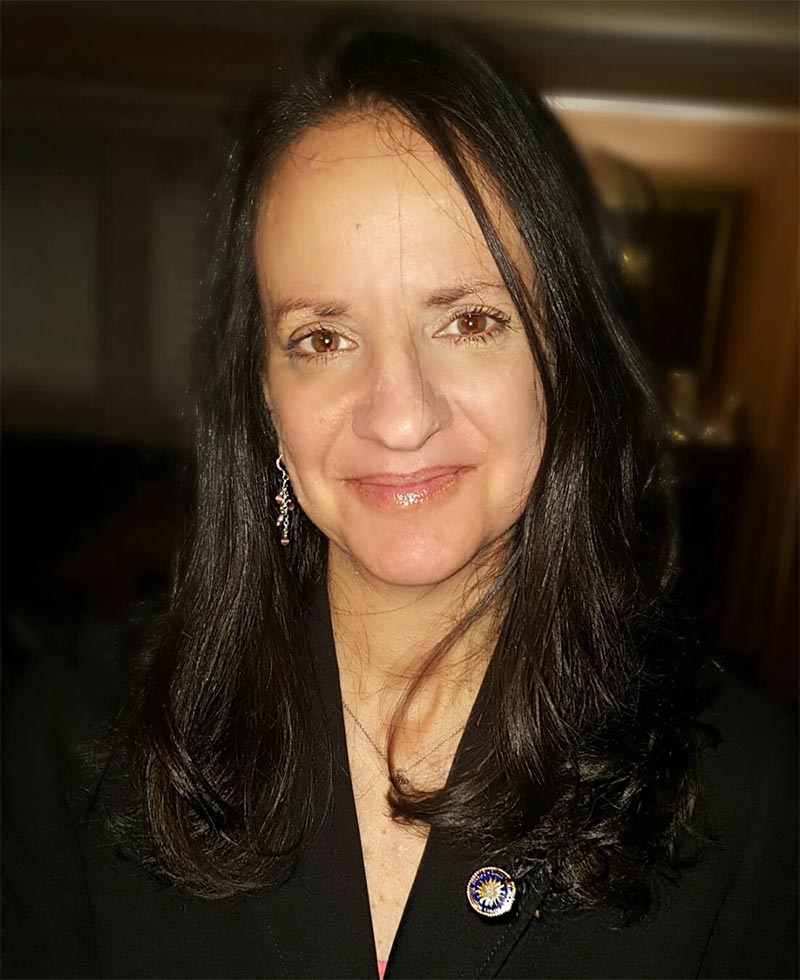
Dr. Carol O’Donnell is Senior Executive and Director of Smithsonian Science Education Center (SSEC), dedicated to transforming K-12 Education through Science™ in collaboration with communities across the globe. As a first-born inner-city college student on financial aid, Carol quickly realized the importance of education in promoting economic mobility. Since then, she has made education her life’s work, working for George Washington University, US Department of Education, and Smithsonian to ensure diversity, equity, accessibility and inclusion (DEAI) of persons excluded from education opportunities because of gender, race, ability, geography, sexual identity, or socio-economic status.
Carol believes in the power of partnerships to promote equity. Along with her Smithsonian colleagues Dr. Amy D’Amico and Dr. Hyunju Lee, and in partnership with Howard University, Carol is the Principal Investigator (PI) on an NSF INCLUDES planning grant, which builds on a public-private partnership between Smithsonian and Shell to support school districts as they diversify the K-12 STEM teaching workforce. With Horizons Greater Washington, and support from Ofinno, Carol and Smithsonian leadership provide summer STEM programming to DC students to reduce the summer skills gap. Through Johnson & Johnson’s WiSTEM2D initiative, Carol promotes girls’ interest in STEM to prepare them for the future workforce. In collaboration with Aerospace Corporation, PPL, and Northrop Grumman, she is ensuring students and families in our nation’s most vulnerable communities are scientifically literate. And with General Motors and the Smithsonian Office of Accessibility, she and her team engage with DC teachers to develop and implement strategies that integrate inclusive/universal design practices into K-12 STEM classrooms, so that all students, no matter their ability level, can see STEM as accessible to them. (Carol’s husband was a special education teacher for 30 years.)
Carol represented the Smithsonian Institution on the 15-Agency committee that contributed to the development of the Federal 5-Year Strategic plan for STEM education that was published on December 4, 2018. Her devotion to an aspect of that Plan in particular — the overarching and inter-woven goal of equity, diversity, and inclusion was significant, tireless and effectively communicated. Carol’s incessant advocacy for that goal permeates the Federal plan, as well as the prose that has manifested in the plan’s guidance to Agencies and the American STEM community at large.
Carol is proud to direct SSEC and serve the Smithsonian family – in addition to her own family of 6 – working each day to fulfill Secretary Lonnie Bunch’s vision to promote DEIA in K-12 education. As an Unsung Hero, Carol is a quiet leader, living by example. She is modest and deferential. This recognition holds up an exemplary person for others to emulate.
Rising Star
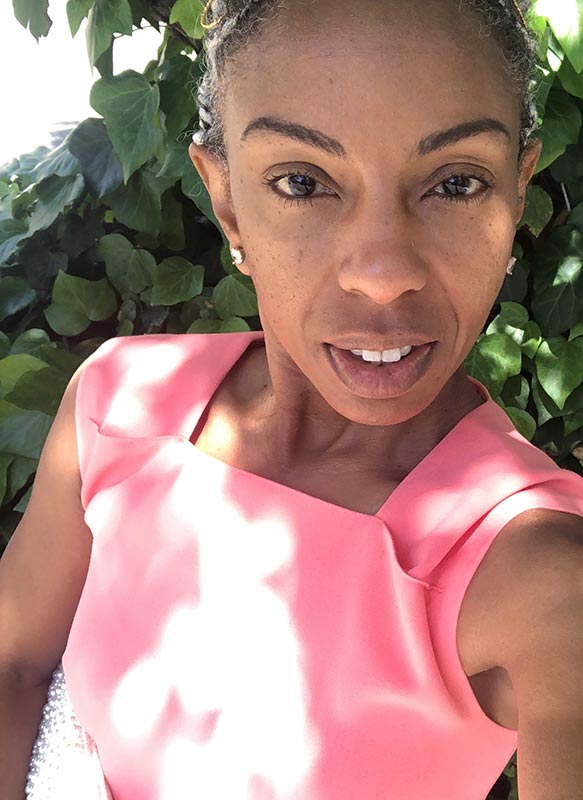
Tonette Salter’s attention to diversity, equity and inclusion is explicit to race, and systemic inequalities of underserved populations. Since 2015, her role as the Equity Analyst for the CA Joint Special Populations Advisory Committee (JSPAC) is to promote equity and access for special populations and underrepresented populations in Career Technical Education in California by providing professional learning for K-14 educators.
Tonette manages a team of professionals K-14 statewide who are making a difference for students. This is no small feat, in a large, populous state there are a wide variety of priorities, opinions and perspectives on how to serve students from special populations. Tonette listens and facilitates to make sure that all perspectives are honored and the team sets out a shared vision. Her responsibilities include holding an annual conference, conducting innovative webinars, coordinating the work of the committee and representing the perspective of equity on statewide councils. Her focus remains true to ensuring that our K12 and community college institutions are supporting students in obtaining the skills and knowledge needed to benefit from high-wage, high demand careers.
She is part of the California Student Equity Achievement Workgroup (SEA) working on equitable funding, policy, and regulations to close the achievement gap. She participated in the draft of the California State Perkins V plan as a stakeholder and representative for special populations. Her practice is to lead systemic change for individuals who have been and continue to be classified as underrepresented in education and the workforce.
She is a graduate of San Diego State University and has an MS in Psychology with an emphasis on research and human performance. She has positioned her career over the past 17 years in development and implementation of restricted funding (Grants) for Career Education/Career Technical Education Programs with emphasis on diversity, equitable access, and inclusion for those classified in the workforce and education as underrepresented and special populations. She serves on the NAPE Executive Committee, is Chair of the Black American Political Association Chapter (BAPAC) San Diego CA Disconnected Youth Committee, an advocate and volunteer for the National Alliance of Mental Health Illness (NAMI), and a board member of the 2nd oldest surviving African American Theatre in the country – Common Ground Theatre-San Diego.
The genesis for her commitment to diversity, equity, and inclusion for underrepresented individuals in education and the workforce is from her sharecropper grandfather who believed in equitable educational opportunities.
LinkedIn @ttonette-salter-ms-psychology
Twitter @#JSPAC4Equity
Lifetime Achievement
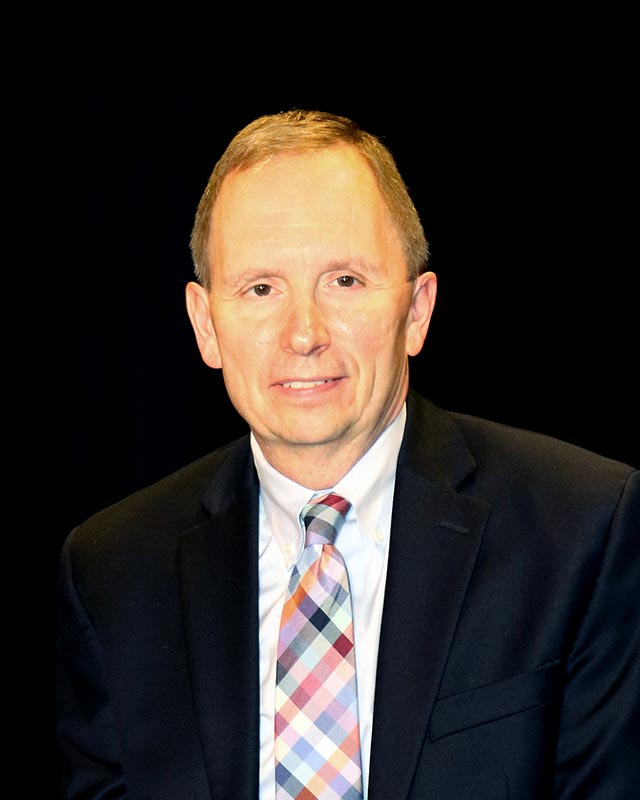
Dennis Harden’s commitment to educational equity spans more than three decades. He is Bureau Chief for Career and Technical Education and State CTE Director at the Iowa Department of Education.
He came to Iowa from the Missouri Department of Education where, in his 32 ½ year career, he consistently demonstrated his commitment to student success leading Missouri’s equity initiatives in CTE. During his time in Missouri, Dennis was a Supervisor of Customized Training overseeing the state’s fund to assist business and industry with their training needs. Dennis then became Director of Industrial Education where he was responsible for Skilled Technical Sciences, Health Sciences, and Technology Education programs as well as the Career and Technical Student Organizations.
Dennis’s last 20 years in Missouri were spent as the Coordinator of Career Education responsible for a budget of $75 million and a staff of 35 that oversaw all CTE program service areas as well as equity initiatives and school counseling.
In 2007, he supported the Missouri Department of Education’s participation in NAPE’s first National Science Foundation funded program, the STEM Equity Pipeline. He has served on the NAPE Education Foundation board since 2010. Consistently an active and engaged Board member, Dennis has participated on a variety of board committees, served as board secretary, participated in a joint strategic planning process with NAPE, and served two terms as president of the board. Dennis has always made himself available to represent NAPE when called upon. His roles as a state leader in CTE, a NAPE member, and NAPE Education Foundation Board member are all indicative of his national influence on equity policy and practice in CTE.
Dennis has been recognized for his achievements in Career and Technical Education including:
2019 Association for Career and Technical Education, Missouri Award of Merit
2019 Missouri SkillsUSA Honorary Life Membership
2019 MoEFACS Lifetime Achievement Award
2011 Missouri FCCLA Honorary Membership Award
2010 Honorary State FFA Degree
2009 Career & Technical Education Equity Council Breaking Traditions Achievement Award
2009 MoACTE Diversity Action Award.
Dennis also is active in other organizations. He serves as a member of the NOCTI Board of Trustees and has been a long-time member of Advance CTE, ACTE, among others.
Dennis’s educational background includes a Bachelor of Science Degree in Business Administration from the University of Central Missouri. He holds a Master’s, Education Specialist, and a Doctor of Education degree in Career and Technical Education, both from the University of Missouri-Columbia.
Dennis has one son, Aaron and his wife Dayna, who reside in Glendale, CA.
Teamwork
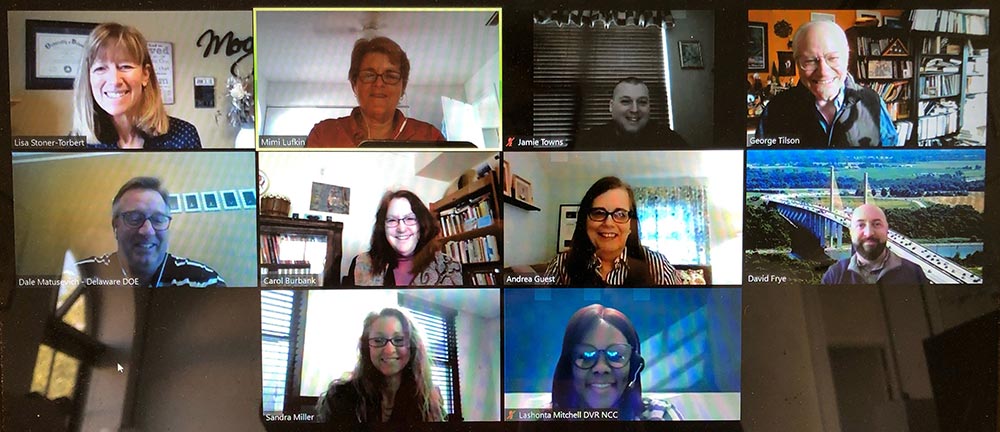
Delaware PIPEline to Career Success for Students with Disabilities Leadership Team
Through NAPE’s PIPE, we found that students with individual education plans were not enrolled in CTE, and those who were enrolled were not in programs that aligned with their career goals. – Michelle Allman, Director of Special Education, The Laurel School District, Delaware
The Delaware Department of Education formed a team of state agencies in Delaware to collaborate with NAPE to implement the PIPEline to Career Success for Students with Disabilities, a modification of NAPE’s Program Improvement Process for Equity (PIPE). The team includes:
Lisa Stoner-Torbert and Dale Matusevich, Department of Education
Sandra Miller and Jamie Towns, Department of Health and Social Services, Division for the Visually Impaired
Jennifer Garcias, Department of Health and Social Services, Division of Developmental Disabilities Services
Andrea Guest, David Fry, Lashonta Mitchell, and Julie O’Donnell, Department of Labor, Division of Vocational Rehabilitation
The first pilot of three school districts showed these increases for their students with disabilities:
- 0% to 7.9% participating in work-based learning
- 10% to 20% enrollment in early childhood education program
- Almost double enrollment in culinary, finance, plant science, teacher academy, biomedical sciences
A team of subject matter experts and instructional designers modified the PIPE curriculum and tools and created new tools in the context of SWDs. Central to these tools is a distillation of the research literature on SWD access and success in CTE. PIPELine was piloted with three school districts in Delaware to determine the efficacy of the application of PIPE to this context, and to inform modifications or refinements before PIPEline is scaled to national, state, and local stakeholders.
The team applied this iterative process to the context of SWD to increase the enrollment, matriculation, graduation, and transition to postsecondary education and competitive employment through CTE career pathways. PIPEline engages teams of educators, community members, and other stakeholders to: 1) use data to conduct a performance and participation gap analysis; 2) learn about the research literature on root causes for these gaps; 3) conduct action research to identify the root causes in play at their institution; 4) select and implement an aligned intervention that directly addresses the identified root causes; and 5) evaluate their success.
This is an exemplary team of diverse state agencies serving SWD. Their commitment to equity with a particular emphasis on SWD has strengthened the relationships between all four state agencies that serve SWD as well as between the agencies and the six school districts participating in the initiative. All partners have invested human and financial resources to ensure the success of the work. In particular, their commitment to student success is breaking down barriers between agencies and increasing their ability to collaborate more effectively. The leadership team has served as a model for the participating district leadership. This has resulted in increased knowledge of effective strategies for serving SWD with teachers from multiple disciplines and the identification of root causes that need to be addressed to help increase SWD success. The district level leadership teams also have demonstrated their commitment to bringing together new and diverse partnerships to impact their goals. The DE Department of Education holds a state membership in NAPE.
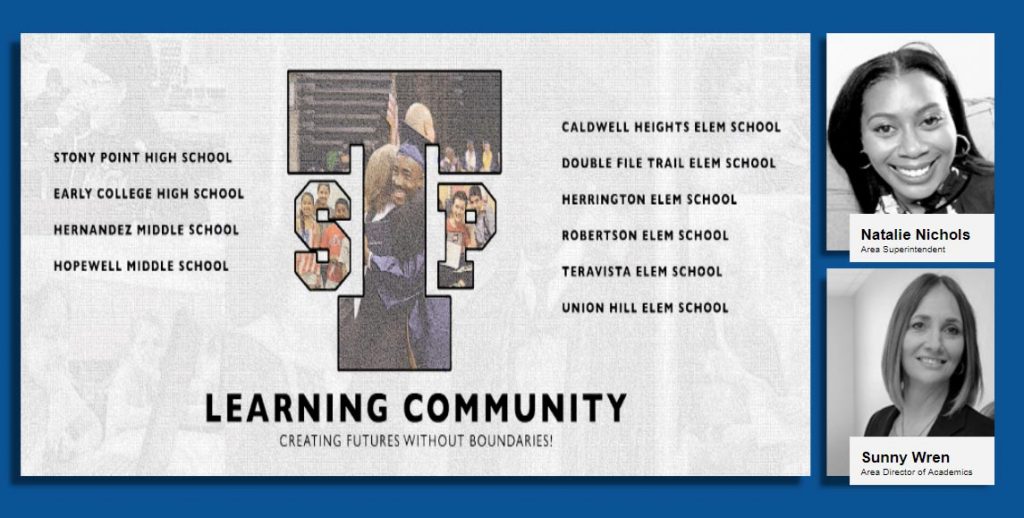
Creating Futures without Boundaries, Stony Point Learning Community, Round Rock Independent School District, Texas
NAPE programs took us from 33% of students in an advanced 6th-grade math class to 75% with no extra allocation of funds or teachers. We’ve eliminated the gatekeepers to advanced classes–teacher recommendations, minimum STAAR/EOC scores, minimum class averages–and instead replaced them with procedures that make this accessible to all.
– Natalie Nichols, Area Superintendent, Stony Point Learning Community, Round Rock ISD
For the past three years, the Stony Point Learning Community has participated in the E3 Alliance Central Texas STEM Equity Initiative in partnership with NAPE and five school districts in Central Texas. Area Superintendent Natalie Nichols formed a cross functional team of educators who actively engaged in NAPE’s suite of Comprehensive Educational Equity Programs (CEEPS) including the:
- Program Improvement Process for Equity™ (PIPE)
- STEM Equity Micromessaging Academy
- Coaching for Educational Equity.
The team has focused on the pipeline for advanced math – a key competency for many high-skill, high-wage, in-demand career paths, especially in STEM/CTE. Team members fully committed to disrupting the process to improve outcomes. Their work has included raising awareness, in-depth data analysis to identify where student groups are underrepresented or underserved, a commitment to honing their equity lens by learning more about the ways educator actions contribute to the marginalization of student groups, and a systematic approach to responding.
The team’s success has been the result of a harmonic effort from all stakeholders.
- District leaders have reviewed policies and systems to determine needed changes.
- Campus leaders have promoted a shift in culture to an inclusive model for participating in advanced coursework.
- Classroom teachers have created supportive environments to nurture a positive math identities for students.
- Parents have shown up (54%-78% participation in parent information meetings across 6 campuses), listened, asked the tough questions, and trusted that “we are who we say we are.”
- Other participants included instructional coaches, counselors, teachers of mathematics at all levels, and Title I parent liaisons.
The active engagement of parents played a critical role. The dedication of principals and counselors (revising choice sheets, revising messaging, presenting during family information nights…) was a key component of increased enrollment.
The results speak for themselves. Enrollment in pre-AP math in sixth grade increased from 33% to 75% from fall 2017 to fall 2020. All demographic groups improved including:
- Girls from 35% to 74%
- Black from 17% to 63%
- Hispanic 25% to 72%
- Low Income 16% to 65%.
Creating Futures without Boundaries – This is the vision for the Stony Point Learning Community. It is the core of all decision making, the driving force for all work, and the center of all celebration. This is how Stony Point measures progress and defines students’ success. Stony Point is invested in the success of every student. Stoney Point is creating futures without boundaries.
Team Members
- Natalie Nichols – Area Superintendent for the Stony Point Learning Community
- Sunny Wren – Area Director of Academics for the Stony Point Learning Community
- David Osman – Director of Research and Evaluation
- Raine Maggio – TAG Coordinator
- Michelle Swain – Director of Gifted and Advanced Academic Services
- Paul Norris – Secondary Math Curriculum Coordinator
- Laura Segers – Executive Director of State and Federal Programs
- Patricia Ephlin – Hernandez Middle School Principal
- Kyle Borel – Robertson Elementary Principal
- Michael Wakefield – Teravista Elementary Principal
- Julie Nelson – Herrington Elementary Principal
- Kimberly Connelly – Union Hill Elementary Principal
- Alifia Britton – Double File Trail Elementary Principal
- Michelle Montalvo – Caldwell Heights Elementary Principal
- Lynda Garinger – Hopewell Middle School Principal
- Anthony Watson – Stony Point High School Principal
Innovation through Challenge
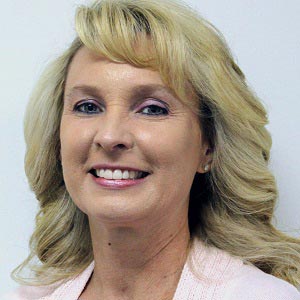
National
LeAnn Wilson is the executive director of the Association for Career and Technical Education (ACTE®), the nation’s largest not-for-profit association committed to empowering educators to deliver high-quality career and technical education (CTE) programs that position students for career success. LeAnn has championed diversity and equity within ACTE. In 2020, despite the COVID pandemic, she created a safe space for facilitating direct and difficult conversations. COVID could have derailed the effort, but LeAnn refused to let this initiative fall by the wayside. With her leadership, it launched and is a huge success.
In concert with ACTE member leaders, Wilson spearheaded ACTE’s Inclusion, Access, Equity and Diversity (IAED) Mentorship Program, which pairs mentors with mentees to cultivate inclusive leadership skills and greater diversity in CTE. Her commitment is demonstrated in her early work to form an ACTE’s IAED Advisory Group, which ensures IAED in CTE resources are embedded in the very fabric of the organization and in all its professional development offerings.
Wilson has also prioritized strategies to maximize member engagement and value and increase public support for CTE students and programs. She has overseen grassroots efforts to reach out to CTE professionals state-by-state to raise awareness of CTE among policymakers and the public, and regularly weighs in on public policy discussions at the national level and in contributions to media publications.
Before taking the helm at ACTE in 2013, she served as the association’s chief financial officer, developing and implementing sound and sustainable institutional plans to increase services, products and support for America’s CTE professionals. Wilson holds a deep appreciation for the work that CTE professionals perform every day to equip their students with the technical, academic and employability skills they will need for college and career success. Wilson has served nonprofit communities for more than 25 years in a variety of financial and leadership positions. She holds a Bachelor of Science in Business Management from the University of Maryland, College Park. She is based in Alexandria, Virginia and has two daughters.
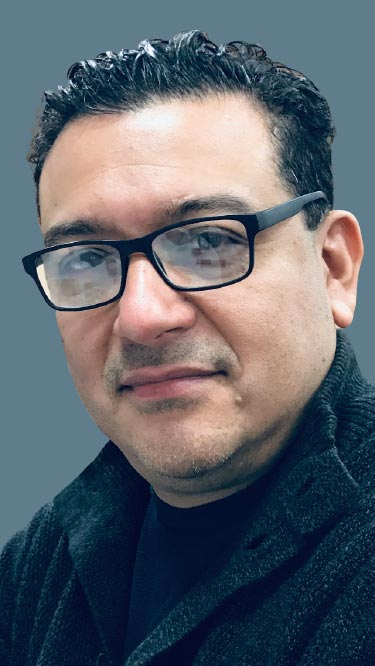
Regional
Gustavo Perez, a STEM Instructional specialist with the Region One Education Service Center in Edinburg, Texas, specializes in K-12 professional development for nearly 30,000 K-12 teachers. For 13 years, Gustavo has demonstrated creativity and an innovative spirit in developing a STEM service model in one of the nations most disenfranchised and economically stricken regions of the United States. This southern region of Texas, commonly referred to as the Rio Grande Valley, encompasses an 8 county region along the US – Mexico border. The area is characterized by a highly concentrated Hispanic population with more than 83.3% of the students classified as economically disadvantaged.
The challenges of the pandemic only served to increase Gustavo’s resolve to ensure educators and students received continued learning opportunities. This required creative thinking to ensure effective remote learning experiences were structured and delivered in an impactful manner. During the spring of 2020, Mr. Perez was instrumental in responding to the pandemic. He served as the lead webmaster and content contributor to a regional web-based repository of over 80 educator webinars dedicated to building capacity in digital classroom management and formative assessment tools, and techniques for virtual communication to reach students, parents and educators.
Gustavo Gustavo’s creativity and leadership has resulted in countless examples of STEM-based staff development opportunities for educators, STEM student outreach efforts and initiatives, community engagement events, and cross-sector partnerships with local institutes of higher education, workforce, and industry.
He organized, designed, and delivered remote based student STEM Exploration camps in partnership with the University of Texas Rio Grande Valley to serve a regional population of 4,100 students. The camps were designed as online project-based learning experiences. Students were presented with regional problems to engage the local impact of the pandemic and were guided to create public awareness artifacts. Additional topics such as digital citizenship and effective online learning habits were reinforced throughout the 2-week experiences.
Lastly, Gustavo developed remote-based STEM staff development experiences to introduce educators to project based learning in an online format. The sessions presented educators with questions to contextualize the regional impact of the pandemic and modeled how to utilize digital, web-based platforms to create virtual products and artifacts. Teachers were asked to pivot between teacher and student perspectives to understand and embrace the evolving nature of online pedagogical practices, teaching remotely, and maintaining high expectations for all students. Over 300 K-12 educators participated in the staff development sessions throughout the 2020 summer.
Gustavo is currently a PhD candidate with Texas Tech University and leads several statewide STEM initiatives. He is active with the Texas STEM EcosySTEM, the Texas Education Agency steering committee for STEM education, and state and regional STEM networks. As an advocate for underrepresented groups and a rising scholar, Gustavo is dedicated to advancing Mexican-American equity, access, and achievement in the STEM fields.
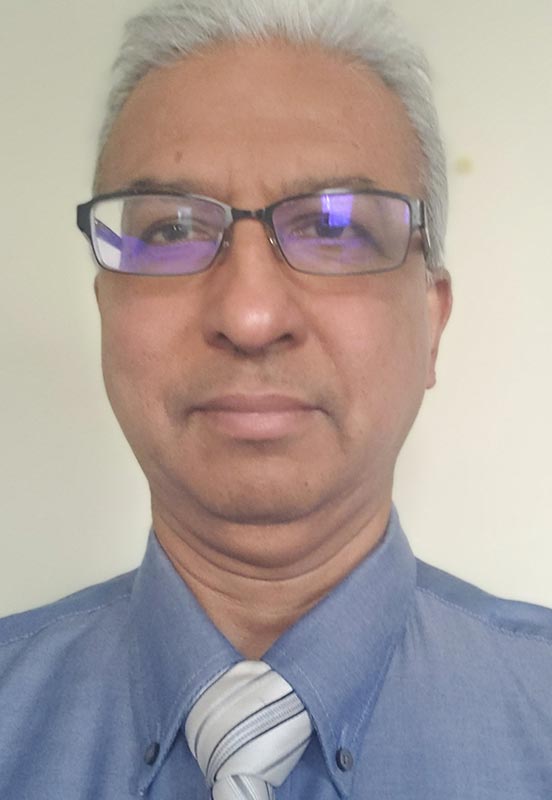
Local
Sundaram Thirukkurungudi has worn multiple hats in fields of pre-k to 12 education, higher education, adult education, corporate training, and academic research for more than 35 years spread over three countries – India, the UAE and the USA. He is a teacher and Collaborative Learning Team (CLT) leader at the Academies of Loudoun, Leesburg, Virginia where he teaches Integrated Science, Multivariable Calculus, and Engineering Research.
Passionate about technology integration and equity in education, he prioritizes coaching students to explore math concepts in the objects and events they encounter in their homes or any place they may visit. He calls this Tupperware Math, a strategy to empower students to own math concepts and eventually shift the responsibility from teachers having to show real life connections to math to students sharing real life connections with their peers and teachers.
Sundaram continuously makes sense of the things around him, making connections, using logic and reasoning and adapting to a new set of “rules.” Long before required by COVID, he began asking his math students to submit their homework electronically. When COVID hit, he assisted his peers in the transition to online instruction, availing himself to teach them the new technologies required for virtual learning. In order to hold the school’s Science Symposium during COVID, he quickly created a website and started working with other colleagues on how to best arrange the data. The county was so impressed with the way he organized their symposium, that their Regional Science Fair is mimicking his design.
Sundaram cares deeply for his students. Not only did he arrange for a low-income student to get a computer for use at home, he took it to the student’s home, installed it, and ensured that it worked. Under his mentorship, Sundaram’s students have won awards in multiple competitions and innovation challenges and have had their research published.
For eight consecutive years, he has received the Outstanding Teacher Award from Virginia Governor’s School for Math and Science and was the state finalist for Virginia Samsung Solve for Tomorrow. Sundaram has published ten peer reviewed publications/conference papers in the fields of Physics, Engineering, and Education. Massachusetts Institute of Technology commended him twice as the teacher who most influenced a student who joined their institute. New Jersey Institute of Technology commended him for his outstanding service in Bridging the Gap of Skills among New Jersey workforce when many workers were losing jobs to the technology boom.
Sundaram has a Masters of Science Degrees in Physics and Education Technology. He has a Graduate Certificate in Education Supervision, and an Education Specialist degree in Education Leadership. As a teacher and leader who has lived and worked in culturally and economically diverse areas, he is well aware of equity and inclusion issues in his classroom. He is an advocate for curricular or evaluation practices to be more inclusive of ethnic and cultural groups.
